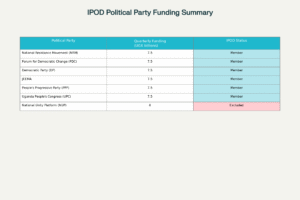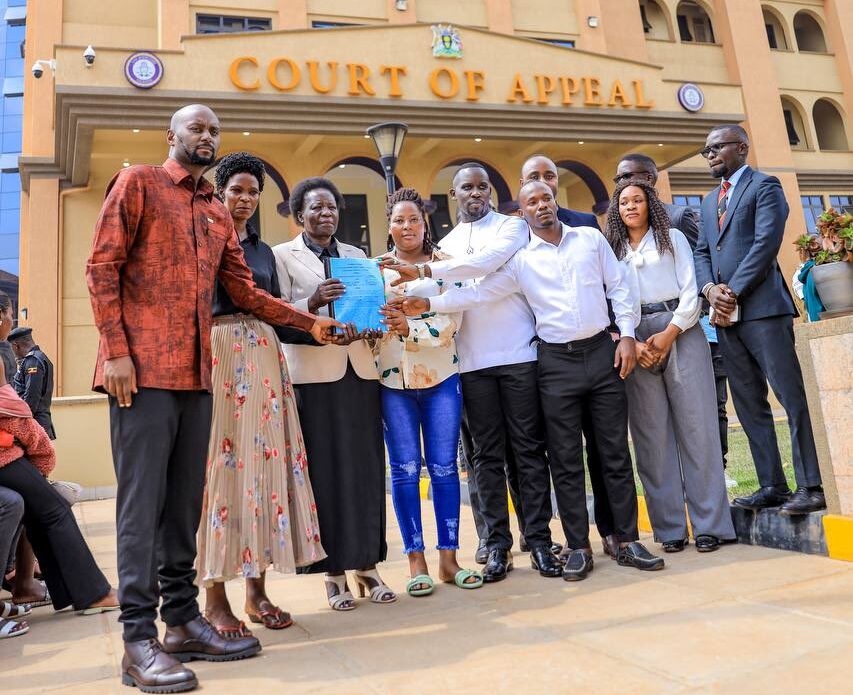The National Unity Platform (NUP), Uganda’s major opposition party, has filed a petition in the High Court challenging the government’s exclusion of NUP from statutory political party funding. This legal move follows a directive issued by the Minister of Justice and Constitutional Affairs on August 25, 2025, which instructed the Electoral Commission (EC) to allocate public funds only to six political parties affiliated with the Inter-Party Organisation for Dialogue (IPOD), excluding NUP entirely.
Background and Legal Claims
NUP contends that the directive violates Uganda’s Constitution and the Political Parties and Organisations Act. They argue it was issued without proper consultation or disclosure of relevant statutory instruments and memoranda underpinning the new funding framework. Since the 2021/2022 financial year, NUP has been receiving quarterly government funding. However, under the amended law from 2025, funding was tied strictly to IPOD membership, sidelining NUP despite its parliamentary strength of 57 MPs and active role as Deputy Chairperson in the National Consultative Forum.
The party describes the directive and any subsequent government actions as irrational and procedurally flawed. NUP claims that decisions favoring IPOD-linked parties on funding were made without their involvement, denying them their constitutional right to equity and fair access to public resources, essential for meaningful political participation in the upcoming 2025/2026 general elections.
Government’s Position and Political Context
The government and the Attorney General dismiss the case as baseless, maintaining the legality of funding distribution tied to IPOD membership. They argue political parties must manage their resources within the statutory framework and that IPOD membership provides a structured platform for dialogue and accountability among political actors.
The existing funding framework allocates about UGX 7.5 billion quarterly to each of the six IPOD member parties: the ruling National Resistance Movement (NRM), Forum for Democratic Change (FDC), Democratic Party (DP), JEEMA, People’s Progressive Party (PPP), and Uganda People’s Congress (UPC).
Impact and Criticism
Excluding NUP has triggered debate on the inclusivity of Uganda’s multiparty democracy. Critics allege that restricting funding to IPOD members marginalizes significant political voices, undermines competition, and diminishes democratic choice. NUP, along with other excluded parties, has vowed to continue its fight in courts and through grassroots mobilization while resorting to private funding to sustain political activities.
Upcoming Legal Proceedings
The High Court has set the next mention of the case for October 10, 2025. The outcome is anticipated to influence future party funding regulations, democratic engagement, and the political climate as Uganda approaches its critical 2025/2026 elections.
Funding Summary Table
| Political Party | Quarterly Funding (UGX billions) | IPOD Membership Status |
|---|---|---|
| National Resistance Movement (NRM) | 7.5 | Member |
| Forum for Democratic Change (FDC) | 7.5 | Member |
| Democratic Party (DP) | 7.5 | Member |
| JEEMA | 7.5 | Member |
| People’s Progressive Party (PPP) | 7.5 | Member |
| Uganda People’s Congress (UPC) | 7.5 | Member |
| National Unity Platform (NUP) | 0 | Excluded |
This table visualizes the current funding disbursed under the IPOD system, emphasizing the exclusion of NUP from the quarterly public allocations despite its significant political stature. The decision to restrict funding exclusively to IPOD members has provoked both legal challenges and political tension in Uganda.


